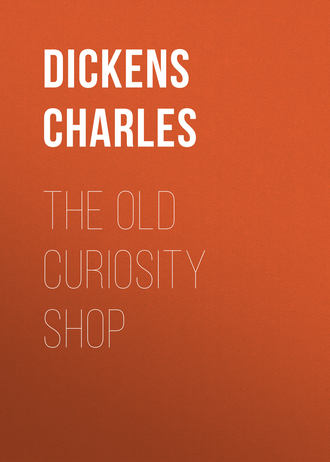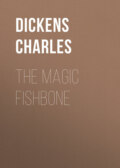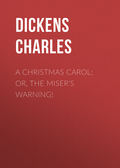
Чарльз Диккенс
The Old Curiosity Shop
The schoolmaster heard her with astonishment. ‘This child!’ – he thought – ‘Has this child heroically persevered under all doubts and dangers, struggled with poverty and suffering, upheld and sustained by strong affection and the consciousness of rectitude alone! And yet the world is full of such heroism. Have I yet to learn that the hardest and best-borne trials are those which are never chronicled in any earthly record, and are suffered every day! And should I be surprised to hear the story of this child!’
What more he thought or said, matters not. It was concluded that Nell and her grandfather should accompany him to the village whither he was bound, and that he should endeavour to find them some humble occupation by which they could subsist. ‘We shall be sure to succeed,’ said the schoolmaster, heartily. ‘The cause is too good a one to fail.’
They arranged to proceed upon their journey next evening, as a stage-waggon, which travelled for some distance on the same road as they must take, would stop at the inn to change horses, and the driver for a small gratuity would give Nell a place inside. A bargain was soon struck when the waggon came; and in due time it rolled away; with the child comfortably bestowed among the softer packages, her grandfather and the schoolmaster walking on beside the driver, and the landlady and all the good folks of the inn screaming out their good wishes and farewells.
What a soothing, luxurious, drowsy way of travelling, to lie inside that slowly-moving mountain, listening to the tinkling of the horses’ bells, the occasional smacking of the carter’s whip, the smooth rolling of the great broad wheels, the rattle of the harness, the cheery good-nights of passing travellers jogging past on little short-stepped horses – all made pleasantly indistinct by the thick awning, which seemed made for lazy listening under, till one fell asleep! The very going to sleep, still with an indistinct idea, as the head jogged to and fro upon the pillow, of moving onward with no trouble or fatigue, and hearing all these sounds like dreamy music, lulling to the senses – and the slow waking up, and finding one’s self staring out through the breezy curtain half-opened in the front, far up into the cold bright sky with its countless stars, and downward at the driver’s lantern dancing on like its namesake Jack of the swamps and marshes, and sideways at the dark grim trees, and forward at the long bare road rising up, up, up, until it stopped abruptly at a sharp high ridge as if there were no more road, and all beyond was sky – and the stopping at the inn to bait, and being helped out, and going into a room with fire and candles, and winking very much, and being agreeably reminded that the night was cold, and anxious for very comfort’s sake to think it colder than it was! – What a delicious journey was that journey in the waggon.
Then the going on again – so fresh at first, and shortly afterwards so sleepy. The waking from a sound nap as the mail came dashing past like a highway comet, with gleaming lamps and rattling hoofs, and visions of a guard behind, standing up to keep his feet warm, and of a gentleman in a fur cap opening his eyes and looking wild and stupefied – the stopping at the turnpike where the man was gone to bed, and knocking at the door until he answered with a smothered shout from under the bed-clothes in the little room above, where the faint light was burning, and presently came down, night-capped and shivering, to throw the gate wide open, and wish all waggons off the road except by day. The cold sharp interval between night and morning – the distant streak of light widening and spreading, and turning from grey to white, and from white to yellow, and from yellow to burning red – the presence of day, with all its cheerfulness and life – men and horses at the plough – birds in the trees and hedges, and boys in solitary fields, frightening them away with rattles. The coming to a town – people busy in the markets; light carts and chaises round the tavern yard; tradesmen standing at their doors; men running horses up and down the street for sale; pigs plunging and grunting in the dirty distance, getting off with long strings at their legs, running into clean chemists’ shops and being dislodged with brooms by ‘prentices; the night coach changing horses – the passengers cheerless, cold, ugly, and discontented, with three months’ growth of hair in one night – the coachman fresh as from a band-box, and exquisitely beautiful by contrast: – so much bustle, so many things in motion, such a variety of incidents – when was there a journey with so many delights as that journey in the waggon!
Sometimes walking for a mile or two while her grandfather rode inside, and sometimes even prevailing upon the schoolmaster to take her place and lie down to rest, Nell travelled on very happily until they came to a large town, where the waggon stopped, and where they spent a night. They passed a large church; and in the streets were a number of old houses, built of a kind of earth or plaster, crossed and re-crossed in a great many directions with black beams, which gave them a remarkable and very ancient look. The doors, too, were arched and low, some with oaken portals and quaint benches, where the former inhabitants had sat on summer evenings. The windows were latticed in little diamond panes, that seemed to wink and blink upon the passengers as if they were dim of sight. They had long since got clear of the smoke and furnaces, except in one or two solitary instances, where a factory planted among fields withered the space about it, like a burning mountain. When they had passed through this town, they entered again upon the country, and began to draw near their place of destination.
It was not so near, however, but that they spent another night upon the road; not that their doing so was quite an act of necessity, but that the schoolmaster, when they approached within a few miles of his village, had a fidgety sense of his dignity as the new clerk, and was unwilling to make his entry in dusty shoes, and travel-disordered dress. It was a fine, clear, autumn morning, when they came upon the scene of his promotion, and stopped to contemplate its beauties.
‘See – here’s the church!’ cried the delighted schoolmaster in a low voice; ‘and that old building close beside it, is the schoolhouse, I’ll be sworn. Five-and-thirty pounds a-year in this beautiful place!’
They admired everything – the old grey porch, the mullioned windows, the venerable gravestones dotting the green churchyard, the ancient tower, the very weathercock; the brown thatched roofs of cottage, barn, and homestead, peeping from among the trees; the stream that rippled by the distant water-mill; the blue Welsh mountains far away. It was for such a spot the child had wearied in the dense, dark, miserable haunts of labour. Upon her bed of ashes, and amidst the squalid horrors through which they had forced their way, visions of such scenes – beautiful indeed, but not more beautiful than this sweet reality – had been always present to her mind. They had seemed to melt into a dim and airy distance, as the prospect of ever beholding them again grew fainter; but, as they receded, she had loved and panted for them more.
‘I must leave you somewhere for a few minutes,’ said the schoolmaster, at length breaking the silence into which they had fallen in their gladness. ‘I have a letter to present, and inquiries to make, you know. Where shall I take you? To the little inn yonder?’
‘Let us wait here,’ rejoined Nell. ‘The gate is open. We will sit in the church porch till you come back.’
‘A good place too,’ said the schoolmaster, leading the way towards it, disencumbering himself of his portmanteau, and placing it on the stone seat. ‘Be sure that I come back with good news, and am not long gone!’
So, the happy schoolmaster put on a bran-new pair of gloves which he had carried in a little parcel in his pocket all the way, and hurried off, full of ardour and excitement.
The child watched him from the porch until the intervening foliage hid him from her view, and then stepped softly out into the old churchyard – so solemn and quiet that every rustle of her dress upon the fallen leaves, which strewed the path and made her footsteps noiseless, seemed an invasion of its silence. It was a very aged, ghostly place; the church had been built many hundreds of years ago, and had once had a convent or monastery attached; for arches in ruins, remains of oriel windows, and fragments of blackened walls, were yet standing; while other portions of the old building, which had crumbled away and fallen down, were mingled with the churchyard earth and overgrown with grass, as if they too claimed a burying-place and sought to mix their ashes with the dust of men. Hard by these gravestones of dead years, and forming a part of the ruin which some pains had been taken to render habitable in modern times, were two small dwellings with sunken windows and oaken doors, fast hastening to decay, empty and desolate.
Upon these tenements, the attention of the child became exclusively riveted. She knew not why. The church, the ruin, the antiquated graves, had equal claims at least upon a stranger’s thoughts, but from the moment when her eyes first rested on these two dwellings, she could turn to nothing else. Even when she had made the circuit of the enclosure, and, returning to the porch, sat pensively waiting for their friend, she took her station where she could still look upon them, and felt as if fascinated towards that spot.
CHAPTER 47
Kit’s mother and the single gentleman – upon whose track it is expedient to follow with hurried steps, lest this history should be chargeable with inconstancy, and the offence of leaving its characters in situations of uncertainty and doubt – Kit’s mother and the single gentleman, speeding onward in the post-chaise-and-four whose departure from the Notary’s door we have already witnessed, soon left the town behind them, and struck fire from the flints of the broad highway.
The good woman, being not a little embarrassed by the novelty of her situation, and certain material apprehensions that perhaps by this time little Jacob, or the baby, or both, had fallen into the fire, or tumbled down stairs, or had been squeezed behind doors, or had scalded their windpipes in endeavouring to allay their thirst at the spouts of tea-kettles, preserved an uneasy silence; and meeting from the window the eyes of turnpike-men, omnibus-drivers, and others, felt in the new dignity of her position like a mourner at a funeral, who, not being greatly afflicted by the loss of the departed, recognizes his every-day acquaintance from the window of the mourning coach, but is constrained to preserve a decent solemnity, and the appearance of being indifferent to all external objects.
To have been indifferent to the companionship of the single gentleman would have been tantamount to being gifted with nerves of steel. Never did chaise inclose, or horses draw, such a restless gentleman as he. He never sat in the same position for two minutes together, but was perpetually tossing his arms and legs about, pulling up the sashes and letting them violently down, or thrusting his head out of one window to draw it in again and thrust it out of another. He carried in his pocket, too, a fire-box of mysterious and unknown construction; and as sure as ever Kit’s mother closed her eyes, so surely – whisk, rattle, fizz – there was the single gentleman consulting his watch by a flame of fire, and letting the sparks fall down among the straw as if there were no such thing as a possibility of himself and Kit’s mother being roasted alive before the boys could stop their horses. Whenever they halted to change, there he was – out of the carriage without letting down the steps, bursting about the inn-yard like a lighted cracker, pulling out his watch by lamp-light and forgetting to look at it before he put it up again, and in short committing so many extravagances that Kit’s mother was quite afraid of him. Then, when the horses were to, in he came like a Harlequin, and before they had gone a mile, out came the watch and the fire-box together, and Kit’s mother as wide awake again, with no hope of a wink of sleep for that stage.
‘Are you comfortable?’ the single gentleman would say after one of these exploits, turning sharply round.
‘Quite, Sir, thank you.’
‘Are you sure? An’t you cold?’
‘It is a little chilly, Sir,’ Kit’s mother would reply.
‘I knew it!’ cried the single gentleman, letting down one of the front glasses. ‘She wants some brandy and water! Of course she does. How could I forget it? Hallo! Stop at the next inn, and call out for a glass of hot brandy and water.’
It was in vain for Kit’s mother to protest that she stood in need of nothing of the kind. The single gentleman was inexorable; and whenever he had exhausted all other modes and fashions of restlessness, it invariably occurred to him that Kit’s mother wanted brandy and water.
In this way they travelled on until near midnight, when they stopped to supper, for which meal the single gentleman ordered everything eatable that the house contained; and because Kit’s mother didn’t eat everything at once, and eat it all, he took it into his head that she must be ill.
‘You’re faint,’ said the single gentleman, who did nothing himself but walk about the room. ‘I see what’s the matter with you, ma’am. You’re faint.’
‘Thank you, sir, I’m not indeed.’
‘I know you are. I’m sure of it. I drag this poor woman from the bosom of her family at a minute’s notice, and she goes on getting fainter and fainter before my eyes. I’m a pretty fellow! How many children have you got, ma’am?’
‘Two, sir, besides Kit.’
‘Boys, ma’am?’
‘Yes, sir.’
‘Are they christened?’
‘Only half baptised as yet, sir.’
‘I’m godfather to both of ‘em. Remember that, if you please, ma’am. You had better have some mulled wine.’
‘I couldn’t touch a drop indeed, sir.’
‘You must,’ said the single gentleman. ‘I see you want it. I ought to have thought of it before.’
Immediately flying to the bell, and calling for mulled wine as impetuously as if it had been wanted for instant use in the recovery of some person apparently drowned, the single gentleman made Kit’s mother swallow a bumper of it at such a high temperature that the tears ran down her face, and then hustled her off to the chaise again, where – not impossibly from the effects of this agreeable sedative – she soon became insensible to his restlessness, and fell fast asleep. Nor were the happy effects of this prescription of a transitory nature, as, notwithstanding that the distance was greater, and the journey longer, than the single gentleman had anticipated, she did not awake until it was broad day, and they were clattering over the pavement of a town.
‘This is the place!’ cried her companion, letting down all the glasses. ‘Drive to the wax-work!’
The boy on the wheeler touched his hat, and setting spurs to his horse, to the end that they might go in brilliantly, all four broke into a smart canter, and dashed through the streets with a noise that brought the good folks wondering to their doors and windows, and drowned the sober voices of the town-clocks as they chimed out half-past eight. They drove up to a door round which a crowd of persons were collected, and there stopped.
‘What’s this?’ said the single gentleman thrusting out his head. ‘Is anything the matter here?’
‘A wedding Sir, a wedding!’ cried several voices. ‘Hurrah!’
The single gentleman, rather bewildered by finding himself the centre of this noisy throng, alighted with the assistance of one of the postilions, and handed out Kit’s mother, at sight of whom the populace cried out, ‘Here’s another wedding!’ and roared and leaped for joy.
‘The world has gone mad, I think,’ said the single gentleman, pressing through the concourse with his supposed bride. ‘Stand back here, will you, and let me knock.’
Anything that makes a noise is satisfactory to a crowd. A score of dirty hands were raised directly to knock for him, and seldom has a knocker of equal powers been made to produce more deafening sounds than this particular engine on the occasion in question. Having rendered these voluntary services, the throng modestly retired a little, preferring that the single gentleman should bear their consequences alone.
‘Now, sir, what do you want!’ said a man with a large white bow at his button-hole, opening the door, and confronting him with a very stoical aspect.
‘Who has been married here, my friend?’ said the single gentleman.
‘I have.’
‘You! and to whom in the devil’s name?’
‘What right have you to ask?’ returned the bridegroom, eyeing him from top to toe.
‘What right!’ cried the single gentleman, drawing the arm of Kit’s mother more tightly through his own, for that good woman evidently had it in contemplation to run away. ‘A right you little dream of. Mind, good people, if this fellow has been marrying a minor – tut, tut, that can’t be. Where is the child you have here, my good fellow. You call her Nell. Where is she?’
As he propounded this question, which Kit’s mother echoed, somebody in a room near at hand, uttered a great shriek, and a stout lady in a white dress came running to the door, and supported herself upon the bridegroom’s arm.
‘Where is she!’ cried this lady. ‘What news have you brought me? What has become of her?’
The single gentleman started back, and gazed upon the face of the late Mrs Jarley (that morning wedded to the philosophic George, to the eternal wrath and despair of Mr Slum the poet), with looks of conflicting apprehension, disappointment, and incredulity. At length he stammered out,
‘I ask you where she is? What do you mean?’
‘Oh sir!’ cried the bride, ‘If you have come here to do her any good, why weren’t you here a week ago?’
‘She is not – not dead?’ said the person to whom she addressed herself, turning very pale.
‘No, not so bad as that.’
‘I thank God!’ cried the single gentleman feebly. ‘Let me come in.’
They drew back to admit him, and when he had entered, closed the door.
‘You see in me, good people,’ he said, turning to the newly-married couple, ‘one to whom life itself is not dearer than the two persons whom I seek. They would not know me. My features are strange to them, but if they or either of them are here, take this good woman with you, and let them see her first, for her they both know. If you deny them from any mistaken regard or fear for them, judge of my intentions by their recognition of this person as their old humble friend.’
‘I always said it!’ cried the bride, ‘I knew she was not a common child! Alas, sir! we have no power to help you, for all that we could do, has been tried in vain.’
With that, they related to him, without disguise or concealment, all that they knew of Nell and her grandfather, from their first meeting with them, down to the time of their sudden disappearance; adding (which was quite true) that they had made every possible effort to trace them, but without success; having been at first in great alarm for their safety, as well as on account of the suspicions to which they themselves might one day be exposed in consequence of their abrupt departure. They dwelt upon the old man’s imbecility of mind, upon the uneasiness the child had always testified when he was absent, upon the company he had been supposed to keep, and upon the increased depression which had gradually crept over her and changed her both in health and spirits. Whether she had missed the old man in the night, and knowing or conjecturing whither he had bent his steps, had gone in pursuit, or whether they had left the house together, they had no means of determining. Certain they considered it, that there was but slender prospect left of hearing of them again, and that whether their flight originated with the old man, or with the child, there was now no hope of their return. To all this, the single gentleman listened with the air of a man quite borne down by grief and disappointment. He shed tears when they spoke of the grandfather, and appeared in deep affliction.
Not to protract this portion of our narrative, and to make short work of a long story, let it be briefly written that before the interview came to a close, the single gentleman deemed he had sufficient evidence of having been told the truth, and that he endeavoured to force upon the bride and bridegroom an acknowledgment of their kindness to the unfriended child, which, however, they steadily declined accepting. In the end, the happy couple jolted away in the caravan to spend their honeymoon in a country excursion; and the single gentleman and Kit’s mother stood ruefully before their carriage-door.
‘Where shall we drive you, sir?’ said the post-boy.
‘You may drive me,’ said the single gentleman, ‘to the – ’ He was not going to add ‘inn,’ but he added it for the sake of Kit’s mother; and to the inn they went.
Rumours had already got abroad that the little girl who used to show the wax-work, was the child of great people who had been stolen from her parents in infancy, and had only just been traced. Opinion was divided whether she was the daughter of a prince, a duke, an earl, a viscount, or a baron, but all agreed upon the main fact, and that the single gentleman was her father; and all bent forward to catch a glimpse, though it were only of the tip of his noble nose, as he rode away, desponding, in his four-horse chaise.
What would he have given to know, and what sorrow would have been saved if he had only known, that at that moment both child and grandfather were seated in the old church porch, patiently awaiting the schoolmaster’s return!





